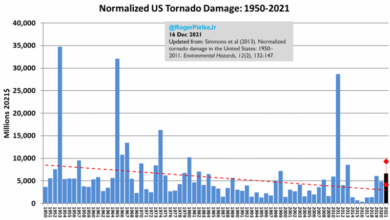Vote Yes on Washington State Initiative 2117

The initiative would repeal the Washington State Climate Commitment Act (CCA), which was approved by the Washington state legislature in 2021. The act requires
Businesses that emit more than 25,000 tons of carbon dioxide per year must buy permits, raising the cost of gasoline, natural gas and other energy sources that rely on fossil fuels.According to the best estimates of its impact, the law increased the price of gasoline by about 50 cents a gallon. A few months after the CCA went into effect, Washington State had the most expensive gas prices at the pump in the nation, while today we rank second behind California, which also has the tax (prices per gallon are shown below, with the highest prices in yellow).
CCA also made natural gas more expensive, significantly increasing heating costs, and since most goods are transported by truck, the prices of food and other necessities also increased.
To illustrate, consider the price of natural gas used for heating in the Seattle Metro area, compared to the rest of the country. In 2020 and 2021, our gas prices were similar to the rest of the country, and in 2022, our prices were cheaper, but after the CCA took effect (January 1, 2023), our gas prices skyrocketed compared to the rest of the country.
The truth must matter
When Governor Inslee pushed for the CCA to be rolled back to 2021, he stated:
His advisers told him otherwise. To put it politely, our Governor has not been straightforward and honest with the citizens of Washington State. Good leadership includes being fair to the public.
Extremely regressive energy taxes hurt low-income earners the most
There is a lot of talk about fairness and equality these days. What is the CCA Gas Tax? very regressivewhile low-income earners face much higher percentage increases in the basic costs of living and working.
Furthermore, wealthy people can afford expensive electric cars and install charging stations at home. Charging is not easy if you live in an apartment.
I really got a sense of the working class perspective when I spoke to a group of groundskeepers. When I mentioned my opposition to the regressive gas tax, the entire group started clapping. Several of them came up to me afterward, telling me about their long commutes and expensive gas prices.
CCA has raised a huge amount of money over the past year and a half: over two billion dollars.
By the way, who do you think are the top two donors to the effort to stop I-2117? Two Microsoft billionaires: Steve Ballmer and Bill Gates. I bet they don’t worry about the cost of filling up their gas tanks.
History of carbon tax initiatives
I, like many others, am concerned about global warming. Back in 2016, I supported another carbon tax initiative (732) because it was not regressive, reduced sales tax, and returned a significant amount of money to low-income residents. The governor and climate activists opposed it because they did not receive any money.
Two years later, the Governor and activists pushed another carbon tax (I-1631), which cashed in on special interests and pet projects. It was extremely regressive and was defeated miserably (I opposed I-1631 because it was unfair to low-income people).
The Climate Commitment Act (CCA) was passed by the state legislature in 2021.
A very ineffective way to fight climate change
Most of the CCA money has been wasted on bureaucratic and inefficient projects with little impact on atmospheric carbon. For example, the two biggest expenditures are:
• $429 million for public transit grants and projects, including free transit for youth under 18 • $223 million for active transportation projects, such as bike paths and safer sidewalks and crosswalks
Free transit for teens is nice, and safer riding is nice, but these efforts will do little to combat climate change. There is little funding for repairing Washington State’s forests (e.g., thinning and controlled burning). Our state’s carbon footprint is still growing. Little progress is being made.
Take a look at Washington State’s greenhouse gas emissions, provided by the WA State Department of Ecology (below). Sharp increase in 2022. Disappointing.
The regressive CCA gas tax, which severely hurts low-income people and does nothing to reduce our carbon emissions, should be repealed. We can do this by going through I-2117.
Then we need new government leadership and better approaches to dealing with climate change. Like a significant increase in the use of nuclear power. Like planning for additional dams and reservoirs. Like FINALLY getting serious about restoring our forests. And much more….









